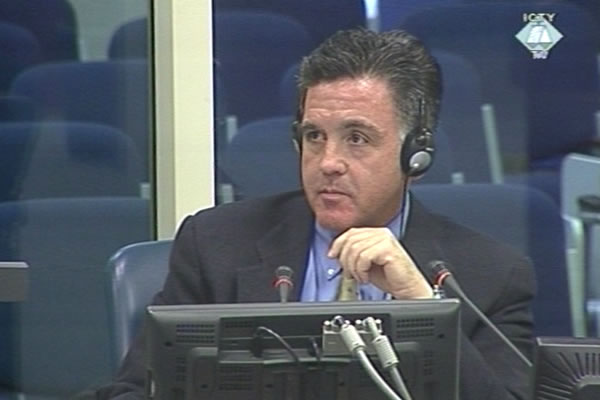Home
PRESIDENT TUDJMAN’S SCHIZOPHRENIA OR INTENT?
Geoffrey Corn, Ante Gotovina's military expert, contends that what Franjo Tudjman said at the Brijuni meeting before Operation Storm was ‘schizophrenic’: on the one hand, Tudjman was trying to figure out how to expel Serb civilians, and on the other, he didn’t want to draw criticism from the international community. According to the prosecution, this was exactly what the Croatian president wanted to do, to bring together those two things by achieving the goals of the joint criminal enterprise without earning the condemnation of the international community
 Geoffrey Corn, svjedok odbrane Ante Gotovine
Geoffrey Corn, svjedok odbrane Ante Gotovine Since the beginning of the trial of Croatian generals Gotovina, Cermak and Markac, the prosecution has been trying to prove that the goal of the Croatian leadership was to expel Serb civilians from Krajina. The best evidence, they argue, is the transcripts of the Brijuni meeting of President Tudjman and the highest military and police officials on 31 July 1995. Prosecutor Russo showed the transcripts today to defense military expert Geoffrey Corn as his cross-examination continued. In his expert report, Corn denied that the artillery attack against the towns in Krajina on 4 and 5 August 1995 was aimed at expelling civilians from towns.
The prosecution brought up the part of the meeting where President Tudjman wants the Serb civilians to be given a corridor to flee from Krajina towards BH; this would affect the Krajina soldiers psychologically and make them follow the civilians, he argues. At the same time, the transcripts show, the president urged his subordinates to do everything to prevent Croatia from losing the international support for the attack against the RSK it had gained. The witness concluded that ‘what President Tudjman said was schizophrenic’: on the one hand Tudjman tried to figure out how to expel civilians, and on the other he was trying not to draw criticism from the international community. According to the witness, the latter could be done only if the civilians were protected.
The prosecution claims that Tudjman’s address at Brijuni was not schizophrenic at all as he had actually planned to reconcile those two things: to expel the Serbs from Krajina and create the illusion that their human rights were respected in the eyes of the international community. To corroborate this, the prosecution showed a part of the transcript where the Croatian president asks for leaflets to be spread among the civilians in Krajina with a description of escape routes towards Serbia, guaranteeing their ‘so-called human rights’ at the same time.
In that particular case it ‘may be reasonable to conclude that President Tudjman exerted pressure on his subordinates to commit acts which are in violation of the provisions of the international law of war’, the American expert replied, adding that there was no proof that General Gotovina agreed to do it. It was not the first time in the history of warfare for the highest political figure in a state to put pressure on the army to do something, only to have the military commanders find a way around it in practice, the witness said.
Since Corn had gone through the Brijuni meeting transcript with a fine-toothed comb in his preparations for testimony, he was able to conclude that General Gotovina was ‘trying to calm the president’ all the time, telling him, ‘You have presented the strategic aims, now allow me to operationalize them’. The prosecution on the other hand argues that Gotovina agreed wholeheartedly with the president’s views. The prosecution showed a part of the transcripts where Tudjman says the artillery should be used with a purported counterattack from Knin as ‘a pretext’. Gotovina replies that the HV could ‘raze the town to the ground if needed’. Contrary to what Corn said, Tudjman then ‘is trying to calm Gotovina’ saying that ‘nothing should be done rashly and adventurously’.
The American expert will continue his evidence tomorrow.
